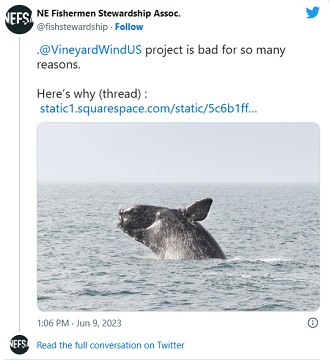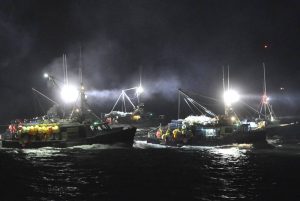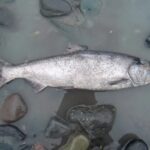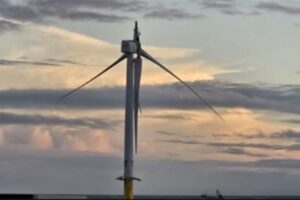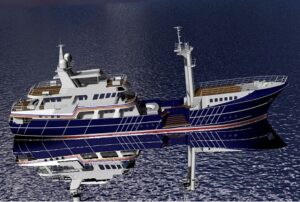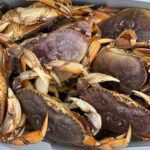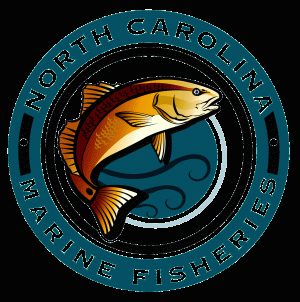The plan would launch the defense fund to help the lobster industry navigate the new rules, laws and regulations that are designed to protect a declining species of whale. Some members of the committee and the lobster industry balked at the idea, in part because it would redirect fees and surcharges the state currently uses to manage the lobster fishing industry. But Republican Rep. William Faulkingham, a commercial lobsterman himself and the sponsor of the bill to create the legal fund, said the industry will need money to win court challenges against new fishing restrictions. >click to read< 16:53
Tag Archives: North American Right Whales
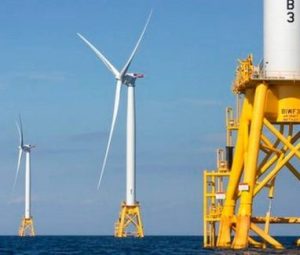
President Biden’s Offshore Wind Policies Make National Lobster Day a Day to Mourn
National Lobster Day was established by Congress to celebrate the tasty crustacean’s place in American history, culture, and commerce. Sadly, due to President Biden’s offshore wind policies, and his agencies’ blame shifting, it may soon become a day to memorialize the passing of a great industry, tradition, and a tasty meal. On December 1, President Joe Biden hosted a state dinner with French President Emmanuel Macron, at which more than 200 Maine lobsters were served. The dinner was rife with hypocrisy since earlier in his administration, Biden’s National Marine Fisheries Service, an office in the National Atmospheric and Oceanic Administration (NOAA), issued new restrictions on Maine’s lobster fishers to protect North American right whales from entanglement with lobster fishing gear. >>click to read<< 10:40
Lobster ‘red list’ draws ire, lawsuit from Maine fishers
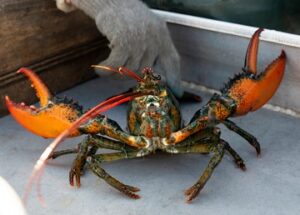 A coalition representing the Maine lobster industry is suing an aquarium on the other side of the country for recommending seafood customers avoid buying a variety of lobster mostly harvested in their state. Industry groups including Maine Lobstermen’s Association are suing the Monterey Bay Aquarium in California for “defamation,” arguing in a lawsuit filed Monday that their prized catch shouldn’t be on a “red list” published by Seafood Watch, a conservation program it operates. Last year, Seafood Watch put lobster from the U.S. and Canada on its list of seafood to avoid due to the threat posed to rare whales by entanglement in fishing gear used to harvest American lobster, the species that makes up most of the U.S. lobster market. >click to read< 15:47
A coalition representing the Maine lobster industry is suing an aquarium on the other side of the country for recommending seafood customers avoid buying a variety of lobster mostly harvested in their state. Industry groups including Maine Lobstermen’s Association are suing the Monterey Bay Aquarium in California for “defamation,” arguing in a lawsuit filed Monday that their prized catch shouldn’t be on a “red list” published by Seafood Watch, a conservation program it operates. Last year, Seafood Watch put lobster from the U.S. and Canada on its list of seafood to avoid due to the threat posed to rare whales by entanglement in fishing gear used to harvest American lobster, the species that makes up most of the U.S. lobster market. >click to read< 15:47

Dem congressman shreds Biden admin for green energy hypocrisy: ‘Pisses me off’
Democratic Maine Rep. Jared Golden blasted the Biden administration for targeting his state’s lobster industry with eco regulations while ignoring the environmental impacts of offshore wind projects. “The hypocrisy part is what pisses me off because we know that right whales, other whales, get struck by freight vessels all the time. Cruise ships that are out there carting people around hit them,” he said. “And yet they see a small business lobster fishery up in Maine that’s not politically important to them and they try to crush it just to try to prove to the environmental groups that they’re actively trying to protect the right whales,” Last week, Golden joined Reps. Jeff Van Drew, R-N.J., Chris Smith, R-N.J., and Andy Harris, R-Md., in writing a letter to federal officials demanding more information about the risks offshore wind projects pose to marine wildlife. >click to read< 07:49

Opinion: Mad Max, where are you now that we need you? By Joel Hovanesian
For decades, Richard Max Strahan has fought for and succeeded many times and was front and center in his quest to save the severely endangered right whales. He was a very outspoken critic of the commercial fisherman and the fishing industry in general, claiming that they were responsible for the dwindling number of whales along the Atlantic seaboard. Your actions and ideas have helped pave the way for many regulations that possibly helped this iconic animal, the jury’s still out on that. Regulations that cost millions of dollars to implement. Today, the right whales and all marine life for that matter are under assault from a much more sinister threat. Ocean wind farms. >click to read< 13:34

Maine to get $1.2 million for lobster gear research and communications tools
Maine’s lobster industry will benefit from $1.2 million in federal funding to study the potential impacts of new regulations on fishing gear. The money comes from the National Oceanic and Atmospheric Administration’s Sea Grant American Lobster Initiative. The Maine Department of Marine Resources will get $750,000 to test and evaluate lobster gear modifications that could be required under a proposal from NOAA to protect endangered right whales. Just over $400,000 will go to the Gulf of Maine Lobster Foundation to provide lobstermen with on-board computers, sensors and other technology to help them collect data and images. >click to read< 08:32

During lone scoping webinar, lobstermen tell NOAA cuts will devastate communities
State officials and Maine lobstermen were not shy when they addressed officials from the National Oceanic and Atmospheric Administration Tuesday night in a scoping webinar held to take public comment after NOAA accelerated the timeline for cuts to the industry. The scoping webinar was the only opportunity provided by NOAA for stakeholders to communicate directly with the agency during the development of additional new measures meant to protect right whales. NOAA accelerated the timeline for risk reduction over what was initially presented in the finalized biological opinion. That document spelled out major cuts to the industry over what was supposed to be a decade. Now, the lobster fishery will need to achieve a 90% risk reduction under phase two of the plan, instead of phase three…much earlier than previously expected. >click to read< 09:14

It’s now or never for Maine’s lobster industry
Driving through and around Belfast on Sunday, I was struck by the half-dozen or so desolated chicken farms. In my youth, Waldo County’s poultry business had gone belly-up. But it seemed more poignant now. Maybe it was because I’ve been stewing over the threat Maine lobster’s industry today faces from an unholy alliance of the federal government and out-of-state special interest groups. Killing Maine’s iconic lobster-fishery is both immoral and unnecessary. Unlike Waldo County’s chicken industry, which in the late 1970s and early 1980s succumbed to competition from Arkansas and Delaware, it is not market forces that Maine lobstermen fear so much as boycotts and excessive regulation based on unproven science. >click to read< By Sam Patten 12:26

Entanglement blame game good for wallets, not for whales
In response to the dissemination of “misleading and false information” about the Maine lobster fishery and their interaction with right whales, not even the federal government (NOAA/NMFS) attributes a right whale death to the Maine fishery. In fact, only two whales have ever been seen in Maine lobster gear and the last one was 18 years ago. A red marker found on gear in 2012 could have come from anywhere in New England. Maine lobstermen voluntarily changed their marker color to purple in 2020 to clearly differentiate themselves from the other New England states and to avoid any further allegations. Deaths and serious injuries in Maine lobster gear have remained constant at zero since right whale observations were initiated. To improve on that is impossible. >click to continue reading<, By Jack Merrill 15:35
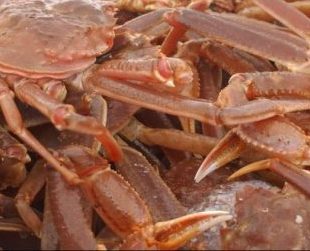
Political pressure for an early opening of the Gulf crab fishery
Quebec urges Ottawa to authorize the opening of the snow crab fishing season as soon as possible in the southern Gulf of St. Lawrence, in which crabbers from the Magdalen Islands, Gaspé and New Brunswick participate. In a letter sent on March 28 to his federal counterpart Joyce Murray, a copy of which was obtained by the QMI Agency, the Quebec minister responsible for fisheries, André Lamontagne, points out that the early opening of the snow crab fishery in the Gulf is, so far, “the most effective adaptation measure that reconciles the protection of Right whales and fishing activities”. >click to read< 10:17

“I guess they’re too weak.” Weak lobstering gear recalled as new whale regs approach
The weak link made by Plante’s Buoy Sticks was pulled off shelves by the company this week, taking away one of the handful of gear options at lobstermen’s disposal to meet new federal rules that go into effect May 1. One retailer said their shop was told the links were believed to be breaking too easily. Plante’s links are one of three models approved by NOAA,,, Virginia Olsen, Maine Lobstering Union, said she sent a notice to her members about the issue and hoped the recall would prompt NOAA to review allowing fishermen the easier option of putting knots in their ropes to make them weaker. “It truly would be a great assistance to us if those knots were acceptable,” she said. >click to read< 14:21
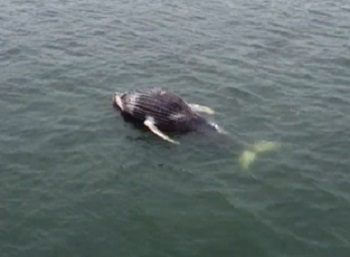
COVID-19 saves right whales by sinking cruise ships
Canada created the Shediac ship restricted zone in April 2020 just a couple weeks before Holland America’s Zaandam was scheduled to sail through that zone on a shipping lane used only seasonally by cruise ships as a shortcut to Quebec City. However, a COVID-19 no-sail order in March 2020 superseded that restriction. Consequently, there was not one Canadian ship right whale strike death in two years and only one Canadian crab entanglement death,,, Zero whales were killed by lobster gear. There has not been one death from lobster gear in the U.S. and only a couple in Canada in over 20 years but the Center for Biological Diversity, with no supporting data, claims the whales are going extinct based on lobster entanglements. >click to read< By Jim O’Connell 07:31
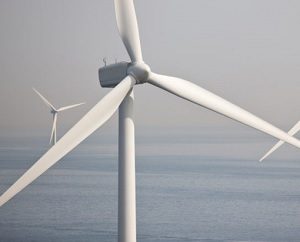
Offshore Wind: Nantucket project faces lawsuit that could impact Skipjack, U.S. Wind projects
Environmentalists are concerned about impact to sea mammals, such as whales and dolphins, The American Coalition for Ocean Protection has been created by the Caesar Rodney Institute to push back against offshore wind development, and they have joined the Vineyard Wind legal case as technical advisors. The case against Vineyard Wind could set a precedent for legal action to be taken locally, where Orsted and U.S. Wind have already secured OREC approvals to begin offshore wind development. The Vineyard Wind case claims there could be environmental harm to the threatened right whale from the project. A coalition in Cape Cod, Mass. the Nantucket Residents Against Turbines, in August filed a suit that calls for delay in the development of 2,000 wind turbines off Nantucket Island and Martha’s Vineyard. >click to read< 12:31

Slowing down big ships not enough to protect right whales from fatal strikes
Current speed restrictions for ships moving through Canadian waters will not prevent North Atlantic right whales from being killed if struck, according to new research that also determined smaller vessels are capable of deadly impacts. “Slowing big ships down does not reduce the death rate as much as we hoped it would,” said Brillant, adding that larger ships obeying current speed restrictions in the Gulf of St. Lawrence, where many right whales feed in the summer, still have an 80 per cent chance of killing a whale if one is struck. >click to read< 08:57
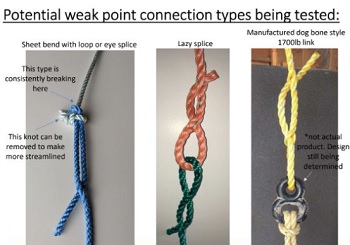
Recommended gear rules for Right Whale safety are adopted
With the National Oceanic Administration’s National Marine Fisheries Service (NMFS) under a fast approaching, court-imposed deadline to develop new whale protection rules, the Zone C Lobster Management Council held a special meeting last week to get an update on the situation from Department of Marine Resources Commissioner Patrick Keliher. The meeting was also an opportunity to consider a zone-specific plan for gear modifications that will likely be required by NMFS. As with many things occurring during the ongoing coronavirus pandemic, the meeting took place in cyberspace. >click to read< 14:43

Federal judge gives NOAA time to craft new whale rules
A federal district court judge, in a decision issued late on Wednesday, Aug. 19, gave the National Oceanic and Atmospheric Administration’s National Marine Fisheries Service (NMFS) nine more months to craft new rules to protect endangered right whales from entanglement in lobster fishing gear. Judge James E. Boasberg also denied a request by conservation organizations for an immediate ban on lobster fishing in a vast area of the ocean south of Nantucket Island in Massachusetts. >click to read< 09:45

Governor Mills Urges Commerce Secretary Ross to Reject Pew Charitable Trusts prohibition petition
Standing up for Maine’s vital lobster industry and its hardworking men and women, Governor Janet Mills today urged U.S. Secretary of Commerce Wilbur Ross to deny a petition by Pew Charitable Trusts that would prohibit the use of vertical lines in the American lobster and Jonah crab fisheries in four areas of the New England coast. In a letter sent to the Commerce Secretary yesterday, Governor Mills explained that the petition, which asks for immediate year-round closures south of Martha’s Vineyard and Nantucket and three seasonal offshore closures in the Gulf of Maine to protect North Atlantic right whales, “not only fails to provide additional protections for right whales, but contrary to Pew’s assertions, it will also cause significant economic impact to Maine’s iconic lobster fishery.” >click to read< 17:03
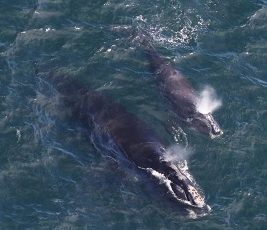
Science Advances report says marine protected areas may not be enough to preserve biodiversity
The paper published Wednesday in the journal Science Advances said climate change will erode the effectiveness of “static” marine protected areas across the globe, and “dynamic ocean management” is needed to preserve biodiversity when species or ecosystems move because of a changing ocean. When the critically endangered whales appeared unexpectedly in the Gulf of St. Lawrence in 2017, the results were disastrous. Twelve right whales whales died and Canada implemented speed limits in shipping lanes and temporary fishing-zone closures. Nine more died this year. >click to read< 09:05

LePage And The Whales
Fisheries managers from the National Oceanographic and Atmospheric Administration (NOAA) are developing new rules that are likely to fall heavily on the lobster industry in New England, especially in Maine, where fishing activity is greatest.,,, Maine’s lobstermen and lobsterwomen found an ally in former Gov. Paul LePage, who recently wrote an op-ed in The Wall Street Journal decrying the proposed rules as misdirected and unnecessary. >click to read< 13:14

Mills’ stand on fishing rules praised by lobster industry
As Executive Director of the Maine Lobstermen’s Association (MLA), I applaud Gov. Mills’ July 11 Message to Maine’s Lobster Industry acknowledging the federal government’s “disturbing lack of evidence connecting the Maine lobster industry to recent right whale deaths.”,,, What is often lost in this debate is that the population of North Atlantic right whales was only 295 in 1997 when federal regulators first required U.S. fishermen to implement conservation measures. In the ensuing years, the right whale population increased to more than 450 whales. >click to read< 11:17
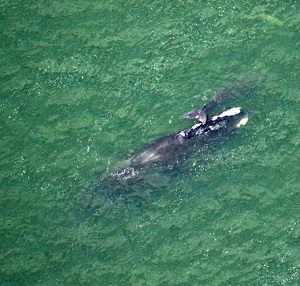
Lucky number 7: Seventh right whale calf spotted off Atlantic coast
One by one, the critically endangered right whales here for this winter’s calving season are delivering new babies that raise optimism among whale researchers. A seventh North Atlantic right whale calf was confirmed this weekend off the Georgia coast, according to National Oceanic and Atmospheric Administration Fisheries. “Every calf that gets us closer to 10 or a dozen is very encouraging,” said Jim Hain, senior scientist and project coordinator for the Marineland Right Whale Project. The newest mom is Pico, or No. 3270. She’s a 17-year-old whale whose last known calf was born in 2011. >click to read<20:48
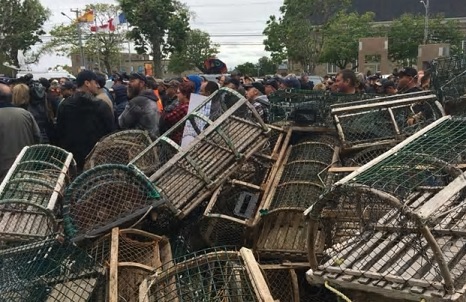
Lobster fishermen create wall of empty traps at protest against closures
Nearly 500 fishermen brought empty lobster traps to Caraquet on Thursday to protest against the closure of fishing areas in the Gulf of St. Lawrence while endangered whales swim there. The protest came after another round of fishing area closures was announced by Ottawa this week because five North American right whales were spotted between Miscou and the Gaspé Peninsula. “We’ve never entangled one in lobster gear in these areas, ever,” said Carl Allen, president of the Maritime Fishermen’s Union, who organized the protest. Allen said the closures not only hurt fishermen and processing plant workers but also local economies on the Acadian Peninsula. >click to read<22:03

Latest fishing area closures raise fears about fights over shrinking territory
About 300 fishermen from across the Acadian Peninsula held an emergency meeting Tuesday to discuss the latest fishing area closure and their options. Exasperated by the federal government’s closures of fishing grounds, fishermen and plant workers from across New Brunswick’s Acadian Peninsula held an emergency meeting Tuesday on Lameque Island to discuss their options. Afterwards, some said they were worried the latest closure would lead to fights over what little territory they have left. The meeting came after another round of fishing area closures was announced Monday, after five North American right whales were seen between Miscou and the Gaspe Peninsula. >click to read<21:41
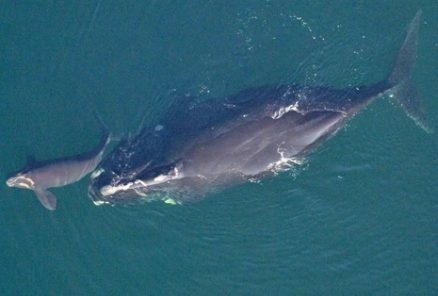
PEIFA shares concerns about right whales
The Prince Edward Island Fishermen’s Association (PEIFA) would like to clarify and expand upon some of the information that has been in the media recently regarding North American Right Whales (NARW). The PEIFA shares the concerns of the public around the declining population of these magnificent marine mammals. The organization has been very active during the past winter attending numerous Department of Fisheries and Oceans Canada (DFO) informational meeting and representing the Prince Edward Island inshore harvesting sector,,, Both the snow crab and lobster fishers on P.E.I. have supported and implemented the reduction of rope in their fishing practises and other gear standardization. >click to read<13:57








